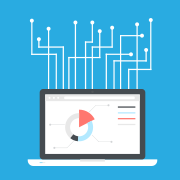Interoperable Health IT Infrastructure Key to Advancing Care
The future of healthcare delivery hinges on the ability interoperable health IT infrastructure to make new and emerging data actionable.

- The first is a global assessment of value-based care The Economist Intelligence Unit. Despite increases worldwide in EHR adoption, several countries, including the United States, have as of yet been unable to put this technology to work fully in domains such as measuring outcomes and costs; integrated and patient-focused care; and outcomes-based payment approach.

Of cost and outcomes measurement, the authors of the report observed a disconnect between the motivation to leverage clinical registries and the ability of most nations to aggregate and share data effectively.
"The impetus to measure outcomes and costs is strengthening through the presence of disease registries and efforts by many countries to implement electronic patient records," the report states. "However, in many instances, these sources of health data are not co-ordinated and the IT systems are not interoperable. Moreover, outcomes data, which are a prerequisite for alignment with value-based care, are almost universally lacking."
In the US, researchers found this to be the case in the country's approach to data standardization for patient outcomes (1/2) and collecting data on patient treatment costs (2/3). Of the former, The Economist Intelligence Unit score the US as having standardized patient data outcomes but lacking the ability to link this data. Of the latter, public and private payers were collecting patient treatment cost data in some areas but not others (as compared to comprehensive collection which would have yield a top score).
In the domain care integration, the authors of the report assessed the US to have scored a zero — no established coordinated care services for mental health, diabetes, HIV, maternal health, or elderly care.
Lastly, the domain of outcomes-based payment approach, the US received a score of 1/3 for its approach to payer support of bundled payments, indicating the use of capitation by one or more payers and lack of a national or regional initiative to develop a bundled payment system.
"For mature economies, there is the challenge of shifting long-held cultural norms, changing payment systems to be tied to value, and standardising IT infrastructure for interoperable and longitudinal data. Some developing countries, meanwhile, are still struggling with basic issues of coverage and access to healthcare," the authors concluded.
The second report comes by way of the PricewaterhouseCoopers Health Research Institute in which the authors identify changes the healthcare industry must implement to keep pace with value-based care, consumerism, technological advances, virtual care, and interest in wellness efforts.
To cope with these seismic changes, authors from the Health Research Institute recommend that healthcare organizations prepare their health IT infrastructure to manage the large amounts of data to be generated in the years to come.
"Data collection, analysis and sharing are the constants across the emerging health ecosystem," they claim. "Organizations must consider how fast the data flow, their variety and accuracy and their integration into feedback loops that help achieve goals, such as adjusting insulin in real-time based on continuous patient health information."
A major focus for healthcare professionals should be on standardization:
Continued standardization of health data will be key to this flow of information. Healthcare providers should continue to unify their data systems, including their electronic medical records systems, within their organizations. They also should work with health information exchanges and other groups to securely and privately share health data, research and other information. These data may come from electronic medical records, and other sources too, such as wearables, biosensors embedded in medication, implantable devices, apps, retailers, genomic testing and social media.
Given the emergence of new data sources and applications for analyzing this data, health IT infrastructure must have the ability to scale to accommodate the data needs of providers, payers, and patients.
Dig Deeper:
• Potential for Healthcare APIs to Revolutionize the Industry
• Transition to Value-Based Care Requires Health Data Exchange
